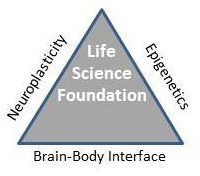In my last blog, I stated that “In the next blog series, I will talk about some of the science that forms the foundation of the SELF™ Program.” In this blog, I introduce the three science concepts that form the foundation of the SELF Empowerment Program™ (SELF™).
I arrived at the three science concepts that form the foundation of the SELF™ Program as I sought to answer the question, ‘what can be done so that all students can have the tools for success my parents and third grade teacher gave me?’

The SELF™ Science Foundation.
Answering this question led me to identify five positive attitudes, and four skills students need to be successful. It also led me to identify some attitudes that students need to avoid to be successful. Two of the positive attitudes are Carol Dweck’s Growth Mindset and Angela Duckworth’s Grit. An attitude to avoid is Claude Steele’s and Joshua Aronson’s Stereotype Threat. Among the skills identified were memory skills, especially working memory, and attention skills. Identifying these attitudes and skills led me to identify three science concepts that help explain how and why the attitudes and skills are so important, and why they are teachable, and are not inherited. The science, attitudes, and skills together also help explain how and why the first sentence of the SELF™ Motto is true, where the first sentence of the SELF™ Motto is, “I have the power to change my self-story, my brain, and my life.”
The three science concepts that explain how and why we are not stuck with the brain we have today are: neuroplasticity; epigenetics; and the brain-body interface. As shown in the graphic, these three science concepts comprise what I call the Life Science Foundation of the SELF™ Program.
Neuroplasticity explains how and why our brain can rewire itself. It explains how and why our brain can learn new functions, and rewire itself, when damaged. In short, neuroplasticity explains how and why everything we do changes our brain.
Epigenetics explains how and why our genes express themselves. Epigenetics tells us that our genes are our hardware. Epigenetics tells us that our epigenome is our software that is affected by our environment. Epigenetics, therefore, explains why and how our environment can influence how our genes express themselves.
The brain-body interface describes how and why our brain and body react to stimuli that cause stress, and why chronic stress can harm our bodies. It also describes how and why our brain and body react to stimuli that create emotions like anger, fear, joy, and hope. And, it enables us to understand how and why we can control our reactions to stress and to emotions like anger and fear.
Taken together these three science concepts – neuroplasticity, epigenetics, and the brain-body interface – form the foundation upon which the rest of the SELF Empowerment Program™ is built.
In the upcoming blogs, I will discuss each of the science concepts, the positive attitudes, and skills in more depth.
